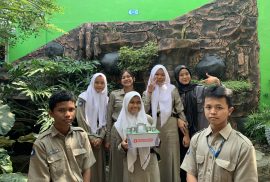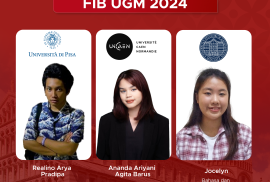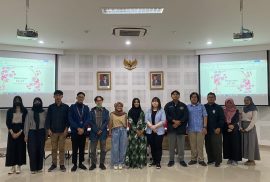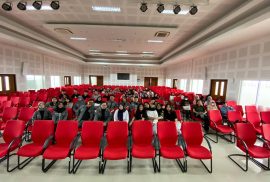On Wednesday, May 22, 2024, the Archaeology Student Association (HIMA UGM), Faculty of Cultural Sciences UGM, through the Community Service Division held the Archaeology Goes To School #1 work program, which is an introduction to archaeology by providing material exposure and games related to archaeology to students of SMP Negeri 2 Ngaglik, Sleman Regency, Yogyakarta Special Region Province. This activity also collaborates with Mandira Brick, as a maker of disassembly game products in the form of miniature temples as educational games for the general public, including students. The activity took place from 10:00 WIB – 12:00 WIB and was two-way interactive interspersed with question and answer sessions and game sessions that divided students in a class into six groups to develop a miniature temple disassembly game.
The activity began with an opening session in a classroom of SMP Negeri 2 Ngaglik with a warm welcome by HIMA UGM students to students. This was followed by a general introduction session about UGM Archaeology and information about the HIMA UGM organization. As for the session after the general introduction, it continued with the presentation of material about Classical Archaeology with the aim of introducing students to restoration and conservation in the treatment of cultural heritage.
“Since our audience is junior high school students, we provide quite basic material about restoration, conservation, the restoration process and how to care for cultural heritage buildings, especially temple buildings. So we provide materials, such as: “The definition of restoration and conservation followed by the process of restoration activities in stages, ending with how to care for the restored temple so that it remains sustainable,” said Arya Sena Prasetio, Chief Executive of Archaeology Goes To School # 1 from the Community Service Division of HIMA UGM, explaining the reason for the presentation of material on Classical Archaeology.
After the material presentation session and interactive question and answer session ended, the students were divided into six groups of five people each to play with the miniature Sukuh Temple and Ratu Boko Temple presented by the Mandira Brick team. Six sets of Mandira disassembly toys were assembled by each group, guided by HIMA UGM students in the process. The toys were then given to the school of SMP Negeri 2 Ngaglik as a continuation of temple restoration and conservation lessons as a means of further learning. The event then ended with a photo documentation session with the students and closing by HIMA UGM students and the Mandira Brick team accompanied by a symbolic plaque and Mandira toys.
“Hopefully with the implementation of Archaeology Goes To School, it can introduce archaeology to school children and provide broader insights into the importance of cultural heritage, as well as motivate students to study more diligently with the existence of new learning media through Mandira Brick,” said Sena about his expectations from the activity






